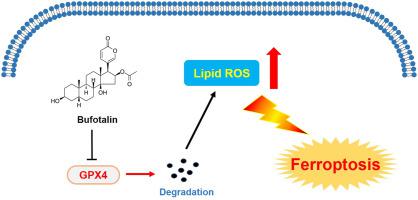Free Radical Biology and Medicine ( IF 7.1 ) Pub Date : 2022-01-14 , DOI: 10.1016/j.freeradbiomed.2022.01.009 Wen Zhang 1 , Baoping Jiang 2 , Yunxin Liu 1 , Li Xu 2 , Meng Wan 1

|
Ferroptosis is a new form of regulated cell death that is dependent on iron- and lipid reactive oxygen species. Emerging evidence indicate that induction of ferroptosis could inhibit the proliferation of diverse cancer cells, which functions as a potent tumor suppressor in cancer. Here, we firstly reported Bufotalin (BT), a natural small molecule, was a novel glutathione peroxidase 4 (GPX4) inhibitor, which could trigger the ferroptosis in non-small cell lung cancer cells. In vitro, BT significantly inhibited the proliferation of A549 cells and induced the ferroptosis, whereas ferroptosis inhibitor or iron chelator significantly reversed the cytotoxicity of BT on A549 cells. Moreover, BT also increased the intracellular Fe2+. Subsequently, immunoblotting showed that BT could inhibit the protein expression of GPX4. Notably, BT dramatically accelerated the degradation of GPX4 in A549 cells. Immunoprecipitation assay further certified the increased ubiquitination of GPX4 induced by BT. Nevertheless, BT could not further increase the lipid ROS after silencing of GPX4, suggesting the induction of ferroptosis by BT was dependent on GPX4. Furthermore, BT also observably inhibited tumor growth and promoted lipid peroxidation in vivo. In conclusion, our findings indicated that BT could induce ferroptosis and cause lipid peroxidation by accelerating the degradation of GPX4 and raising the intracellular Fe2+, and BT will hopefully serve as a lead compound in developing anti-tumor agents for targeting ferroptosis.
中文翻译:

Bufotalin通过促进GPX4的泛素化和降解诱导非小细胞肺癌细胞铁死亡
铁死亡是一种新的受调控的细胞死亡形式,它依赖于铁和脂质活性氧。新出现的证据表明,铁死亡的诱导可以抑制多种癌细胞的增殖,这些细胞在癌症中起着有效的肿瘤抑制作用。在这里,我们首先报道了天然小分子 Bufotalin (BT) 是一种新型谷胱甘肽过氧化物酶 4 (GPX4) 抑制剂,可引发非小细胞肺癌细胞的铁死亡。在体外,BT显着抑制A549细胞的增殖并诱导铁死亡,而铁死亡抑制剂或铁螯合剂显着逆转BT对A549细胞的细胞毒性。此外,BT 还增加了细胞内 Fe 2+. 随后,免疫印迹显示BT可以抑制GPX4的蛋白表达。值得注意的是,BT 显着加速了 A549 细胞中 GPX4 的降解。免疫沉淀测定进一步证明了 BT 诱导的 GPX4 泛素化增加。然而,BT 在 GPX4 沉默后不能进一步增加脂质 ROS,这表明 BT 对铁死亡的诱导依赖于 GPX4。此外,BT 还显着抑制肿瘤生长并促进体内脂质过氧化。总之,我们的研究结果表明,BT可以通过加速GPX4的降解和提高细胞内Fe 2+来诱导铁死亡并引起脂质过氧化,BT有望成为开发针对铁死亡的抗肿瘤药物的先导化合物。











































 京公网安备 11010802027423号
京公网安备 11010802027423号